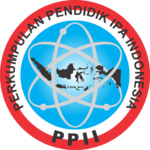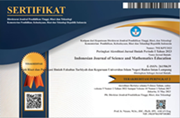Practicality Analysis of PBL-Based Mathematics in Circle Material
Abstract
Keywords
Full Text:
PDFReferences
M. A. Suparman, Desain Instruksional Modern: Panduan Para Pengajar Dan Innovator Pendidikan. Jakarta: Erlangga, 2014.
A. Setyadi and A. A. Saefudin, “Pengembangan modul matematika dengan model pembelajaran berbasis masalah untuk siswa kelas VII SMP,” Pythagoras J. Pendidik. Mat., vol. 14, no. 1, pp. 12–22, 2019, doi: 10.21831/pg.v14i1.16771.
P. Pitriati, “Pembelajaran Matematika Menggunakan Model Learning Cycle 5E Untuk Meningkatkan Kemampuan Penalaran Matematis Siswa SMP 30 Padang,” Indones. J. Sci. Math. Educ., vol. 2, no. 2, pp. 235–244, 2019, doi: 10.24042/ijsme.v2i2.4397.
R. Ardiansyah, A. D. Corebima, and F. Rohman, “Analisis Kebutuhan Pengembangan Bahan Ajar Perubahan Materi Genetik pada Matakuliah Genetika di Universitas Negeri Malang,” Semin. Nas. Pendidik. dan Saintek 2016, vol. 2016, p. 1, 2016.
Depdiknas, Panduan umum pengembangan bahan ajar. Jakarta: Depdiknas, 2006.
E. Tjiptiany, A. As’ari, and M. Muksar, “Pengembangan Modul Pembelajaran Matematika Dengan Pendekatan Inkuiri Untuk Membantu Siswa SMA Kelas X Dalam Memahami Materi Peluang.,” J. Pendidik. - Teor. Penelitian, dan Pengemb., vol. 1, no. 10, pp. 1938–1942, 2016, doi: 10.17977/jp.v1i10.6973.
Y. N. Telaumbanua, B. Sinaga, Mukhtar, and E. Surya, “Development of Mathematics Module Based on Metacognitive Strategy in Improving Students’ Mathematical Problem Solving Ability at High School,” J. Educ. Pract., vol. 8, no. 19, pp. 73–80, 2017.
Depdiknas, panduan pengembangan bahan ajar. Jakarta: Departemen Pendidikan Nasional Direktur Jenderal Manajemen Dasar dan Menengah Direktorat Pembinaan Sekolah Menengah Atas, 2008.
E. Ersoy and N. Başer, “The Effects of Problem-based Learning Method in Higher Education on Creative Thinking,” Procedia - Soc. Behav. Sci., vol. 116, pp. 3494–3498, 2014, doi: 10.1016/j.sbspro.2014.01.790.
N. Za’Ba and S. Prabawanto, “The development of the problem-based learning module to facilitate students’ mathematical reasoning,” J. Phys. Conf. Ser., vol. 1157, no. 3, pp. 48–52, 2019, doi: 10.1088/1742-6596/1157/3/032107.
N. Angraini and R. Masykur, “Modul Matematika Berdasarkan Model Pembelajaran Problem Based Learning Materi Pokok Trigonometri,” Desimal J. Mat., vol. 1, no. 2, p. 217, 2018, doi: 10.24042/djm.v1i2.2558.
Budiyono, pengantar penilaian hasil belajar. Surakarta: Universitas sebelas maret press, 2015.
T. Deviana, “Analisis Kebutuhan Pengembangan Kabupaten Tulungagung Untuk Kelas V Sd,” J. Pemikir. dan Pengemb. SD, vol. 6, no. 20, pp. 47–56, 2018.
U. Erawanto and E. Santoso, “Pengembangan Modul Pembelajaran Berbasis Masalah Untuk Membantu Meningkatkan Berfikir Kreatif Mahasiswa,” JINoP (Jurnal Inov. Pembelajaran), vol. 2, no. 2, p. 427, 2016, doi: 10.22219/jinop.v2i2.2629.
E. Alfiriani, Adlia; Hutabri, “Kepraktisan dan Keefektifan Modul Pembelajaran Bilingual Berbasis Komputer,” J. kependidikan, vol. 1, no. 1, pp. 12–23, 2017.
Z. Putra, A. Kaharudin, B. Rahim, and R. Nabawi, “The Practicality of Learning Module Based on Jigsaw-Cooperative Learning Model in Media Education Course,” Adv. Soc. Sci. Educ. Humanit. Res., vol. 201, no. Aptekindo, pp. 48–52, 2018, doi: 10.2991/aptekindo-18.2018.11.
Budiyono, Pengantar metodologi penelitian pendidikan. Surakarta: Universitas sebelas maret press, 2017.
N. Kusuma, F. Rizal, A. Yulastri, and U. N. Padang, “Practicality of Teaching Learning Materials Vocational Skills For Facilities In SLB 1 Lima Kaum,” Al murabbi J. Pendidik. Agama Islam, vol. 5, no. 2, pp. 17–21, 2020.
Y. Agustyaningrum, Nina; Gusmania, “Practicality and Effectiveness of Geometry Analysis Module,” J. Dimens., vol. 6, no. 3, pp. 412–420, 2017.
Yerimadesi, Y. Kiram, Lufri, and Festiyed, “Development of guided discovery learning based module on colloidal system topic for senior high school,” J. Phys. Conf. Ser., vol. 1116, no. 4, pp. 1–11, 2018, doi: 10.1088/1742-6596/1116/4/042044.
F. yulastri, A; Hidayat, H; Ganefri; Islami, S; Edya, “Developing an entrepreneurship module by using product-based learning approach in vocational education,” Int. J. Environ. Sci. Educ., vol. 12, no. 5, pp. 1097–1109, 2017.
W. Permatasari and Y. Yerimadesi, “Analisis Validitas dan Praktikalitas dari Modul Minyak Bumi Berbasis Guided Discovery Learning,” Edukimia, vol. 2, no. 1, pp. 25–31, 2020, doi: 10.24036/ekj.v2.i1.a118.
I. Lasmiyati; Harta, “Pengembangan Modul Pembelajaran untuk Meningkatkan Pemahaman Konsep dan Minat SMP,” Pythagoras J. Pendidik. Mat., vol. 9, no. 2, pp. 161–174, 2014, doi: 10.21831/pg.v9i2.9077.
DOI: http://dx.doi.org/10.24042/ijsme.v3i3.7271
Refbacks
- There are currently no refbacks.
Copyright (c) 2020 Unit Riset dan Publikasi Ilmiah FTK UIN Raden Intan Lampung

This work is licensed under a Creative Commons Attribution-ShareAlike 4.0 International License.

Indonesian Journal of Science and Mathematics Education is licensed under a Creative Commons Attribution-ShareAlike 4.0 International License.



